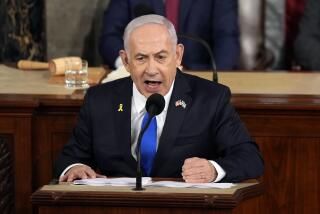Clinton, Barak Agree on Plan to Strengthen Military Ties
- Share via
WASHINGTON — President Clinton and Israeli Prime Minister Ehud Barak agreed Monday on measures to increase Israel’s security and military might, restoring a traditional relationship that was frayed during the tenure of former Prime Minister Benjamin Netanyahu.
Both leaders said enhanced U.S.-Israeli strategic cooperation will make Israel strong enough to take risks for peace with Syria and the Palestinians. Clinton insisted that the steps will make U.S. mediation more effective with the Arabs, even if it looks like Washington is siding with Israel.
“The United States can only be of value to the Palestinians because we are so close to Israel,” Clinton said during a joint news conference with Barak. “Otherwise, of what value are we to them?”
During Netanyahu’s stormy tenure, there was an unprecedented level of friction between the United States and Israel. As a result, Clinton has established a relatively close relationship with Palestinian Authority President Yasser Arafat and other Arab leaders.
Clinton clearly hopes those ties will survive a renewal of Washington’s support for Israel, although that may be a tall order.
“Only a strong and secure Israel is capable of making the difficult choices that the [peace] process requires,” Barak said. “A strong Israeli-American relationship must be the cornerstone on which to build a peaceful Middle East.”
He vowed to press negotiations with Syria and the Palestinians simultaneously, hoping to show significant results by October 2000--just one month before the U.S. election that will select Clinton’s successor. But Barak said the 15-month goal is not a hard-and-fast deadline.
“I use the kind of framework of 15 months to signal to all publics and us, the players, that we are not talking about a miraculous solution . . . that will drop upon us from heaven in three weeks,” Barak said. “And we are not intending to drag our feet for another three years.”
There are compelling reasons for Barak to move promptly.
He enjoys a strong mandate from voters and an overwhelming majority in parliament. But his coalition of religious and secular parties, spanning a broad ideological spectrum, is in danger of tearing itself apart over domestic issues.
U.S. officials and outside experts say that to make peace, Barak must move before infighting starts.
But the emphasis during Barak’s six-day visit to the United States, which ends today, was on the U.S.-Israeli relationship. Both American and Israeli officials said the talks went very well.
Clinton and Barak agreed to increase U.S. military aid to Israel, now about $1.8 billion annually, by one-third over the next 10 years to $2.4 billion. To compensate, Israel’s nonmilitary economic aid, now about $800 million a year, will be phased out over the same time period. The result, if Congress approves the restructured aid plan, will be a reduction of about $200 million annually in the total package and a shift in emphasis even more toward the military.
The two governments agreed to establish two joint defense committees staffed by senior officials.
One, designated the Strategic Policy Planning Group, would draft measures to “bolster Israel’s indigenous defense and deterrent capabilities.” The other, a Defense Policy Advisory Group, is to be instructed to work on theater missile defense and other measures to meet the threat from missiles and weapons of mass destruction.
The nations agreed on increased coordination between their space programs. They said an Israeli astronaut and an Israeli scientific package will be aboard a U.S. space shuttle next year.
Also, Clinton pledged U.S. aid for an additional battery of the Israeli-developed Arrow antimissile system.
On the only purely civilian measure addressed in the joint statement, the United States pledged to work with Israel and other nations in the region to promote the development of water sources, including through desalination, and to examine ways to transfer water to arid lands.
“Today we have agreed to strengthen our security assistance to Israel so Israel can best meet the threats to its citizens, including terrorism and the growing threat of long-range missiles and weapons of mass destruction,” Clinton said.
Barak’s pledge to pursue peace with Syria and the Palestinians simultaneously is in distinct contrast with Netanyahu. Many U.S. experts predict that Israel has a better chance of making an early peace with Syria because the issues are less complex and somewhat less emotional.
Syrian President Hafez Assad has sent a series of oblique signals that he is willing to deal. They include a spate of news agency reports from Damascus, the Syrian capital, saying Assad’s government has told the leaders of several Palestinian groups based in Syria to end acts of terrorism against Israeli targets. The Damascus-based groups are considered terrorist organizations by Israel and the United States.
At their news conference, Clinton and Barak said they were unable to confirm the reports but that such steps by Syria would be welcome.
“If there was such a meeting and the Syrians really asked the terror organizations to reduce their level of activity, if that is true, it is, of course, good news for all of us,” Barak said.
Added Clinton: “We too would like more normal relations with Syria. . . . Anything that Syria does to disassociate itself from terrorists is a positive step in the right direction.”
Clinton said he would contact Assad to urge him to reopen talks with the Israelis. He said he would advise the Syrian president that it was time to make progress in negotiations.
On one issue, the two leaders remained far apart. Barak indicated that he asked Clinton to release Jonathan Jay Pollard, a former Navy civilian employee serving a life sentence for spying for Israel. U.S. officials said there are no immediate plans to set him free.
More to Read
Sign up for Essential California
The most important California stories and recommendations in your inbox every morning.
You may occasionally receive promotional content from the Los Angeles Times.













